|
|
|
Sort Order |
|
|
|
Items / Page
|
|
|
|
|
|
|
| Srl | Item |
| 1 |
ID:
112882
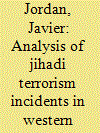

|
|
|
|
|
| Publication |
2012.
|
| Summary/Abstract |
This article offers a descriptive analysis of jihadi terrorist activity in Western Europe during the years 2001-2010. Following collection and classification, the information has been analyzed using the following variables: target countries, terrorist method used, stays in training camps, links to organizations, and degree of completion of the terrorist incidents.
|
|
|
|
|
|
|
|
|
|
|
|
|
|
|
|
| 2 |
ID:
171110
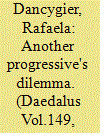

|
|
|
|
|
| Summary/Abstract |
Immigration and the diversity it brings have led to the emergence of the “progressive's dilemma” whereby open societies that take in immigrant outsiders may find it difficult to maintain the solidarity required to sustain the welfare state. In this essay, I address another progressive's dilemma: Focusing on the case of Western Europe, I argue that when open borders give rise to radical-right parties, immigration can inadvertently also endanger progressive achievements in gender equality. Though xenophobic policies frequently constitute their core message and the primary source of their appeal, radical-right parties are also defenders of traditional family values and outspoken critics of measures that promote the economic and political advancement of women. Moreover, the composition of these parties, both in terms of voters and politicians, is disproportionately male. As a result, when radical-right, anti-immigrant parties enter national parliaments, the descriptive and substantive representation of women suffers, sometimes reversing long-held gains in gender equality.
|
|
|
|
|
|
|
|
|
|
|
|
|
|
|
|
| 3 |
ID:
138691
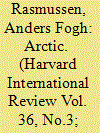

|
|
|
|
|
| Summary/Abstract |
It is unique for its climate and geography: for natural phenomena such as the midnight sun and the Northern Lights, as well as the creatures and the cultures which have evolved there. Throughout human history, it has been viewed with reverence as a special and mysterious place where unique rules apply. However, global warming has begun to reveal the secrets of the Arctic, lifting the shroud of ice, which has veiled the region for millennia, and opening it to ever-greater traffic.
|
|
|
|
|
|
|
|
|
|
|
|
|
|
|
|
| 4 |
ID:
133418
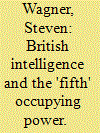

|
|
|
|
|
| Publication |
2014.
|
| Summary/Abstract |
At the end of the Second World War, British intelligence struggled to enforce strict limits imposed on Jewish immigration to Palestine. Holocaust survivors and Jews wishing to escape communism in Eastern Europe flooded the western Zones of occupation in Germany and Austria, while the Zionist movement worked to bring them to Palestine. Illegal immigration to Palestine was the key policy dispute between Britain and the Zionist movement, and a focus for British intelligence. Britain sought both overt and covert means to prevent the boarding of ships at European ports which were destined for Palestine, and even to prevent the entry of Jewish refugees into the American zones. This article highlights Britain's secret intelligence-gathering efforts as well as its covert action aimed to prevent this movement. It highlights a peculiar episode in the 'special relationship' between Britain and the United States, during which cooperation and partnership was lacking. British intelligence promoted a rumour that Soviet agents were using Jewish escape lines to penetrate Western Europe and the Middle East in order to persuade American authorities to prevent the movement of Jewish refugees. Instead, this article argues, American intelligence secretly cooperated with the Zionist organizers of the escape routes so to expose Soviet agents. Britain's attempt at deception backfired, and provided effective cover for the movement of hundreds of thousands of Jews during a critical period. Meanwhile its intelligence had dramatically improved, but policymakers failed to reassess Britain's ability to sustain immigration restrictions and the indefinite detention of tens of thousands of illegal migrants.
|
|
|
|
|
|
|
|
|
|
|
|
|
|
|
|
| 5 |
ID:
139809
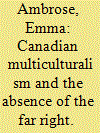

|
|
|
|
|
| Summary/Abstract |
The far right has never been a prominent force in Canadian politics or society. Traditionally, they more resembled the North American than the West European model: ideologically dominated by right-wing populism and white supremacy, organizationally characterized by factionalism and sectarianism. The extreme right seems an almost negligible force today, in part reflecting a similar decline in the United States, while the radical right has so far been unable to build upon the recent upsurge of Islamophobia, as in Western Europe. We argue that the failure of the Canadian radical right is primarily the result of Canada's unique multiculturalism policy, which is based on a combination of selective immigration, comprehensive integration, and strong state repression of dissent on these policies. This unique blend of policies has led to a relatively low level of opposition to multiculturalism and has left little legal and political space for far right politics.
|
|
|
|
|
|
|
|
|
|
|
|
|
|
|
|
| 6 |
ID:
141278
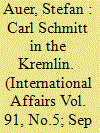

|
|
|
|
|
| Summary/Abstract |
The protracted crisis in Ukraine has exposed fundamental political differences between leaders in western Europe and their counterparts in Russia. The very existence of the European Union was meant to have refuted geopolitics as a useful theoretical lens through which to view power relations in Europe. After all, the European project is based on the idea that boundaries no longer matter and that national sovereignty is obsolete. And yet, geopolitics remains critically important—certainly for Europe's potential enemies, but also for Europe itself. It is poignant that to advance our understanding of this new constellation we are well served to turn to the insights of a classic, if hugely controversial, German political thinker: Carl Schmitt. Schmitt's political philosophy is relevant in three aspects. First, as a source of inspiration—even if only indirectly—for the contemporary Russian political establishment. Second, the behaviour of Putin's Russia, particularly since 2008, can be best understood through some of the key concepts that preoccupied Schmitt: sovereignty, the political and geopolitics. Third, Schmitt's philosophy can serve as a point of departure for reflecting on the possibility of a more robust response by Europe to the Russian intervention in Ukraine. What Europe needs is a more hard-nosed realist approach, which recognizes that Russia's expansionist ambitions can only be constrained by its own readiness and willingness to deploy power both politically and, if necessary, even militarily.
|
|
|
|
|
|
|
|
|
|
|
|
|
|
|
|
| 7 |
ID:
107552
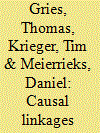

|
|
|
|
|
| Publication |
2011.
|
| Summary/Abstract |
We use the Hsiao-Granger method to test for terrorism-growth causality for seven Western European countries. In bivariate settings, the impact of economic performance on domestic terrorism is very strong. In trivariate settings, the impact of performance on terrorism diminishes. In general, we find that economic performance leads terrorist violence in robust ways only for three out of seven countries. Terrorism is almost never found to causally influence growth in bivariate and trivariate specifications. Our findings indicate that the role of economic performance in determining terrorist violence appears to have been important for some countries, whereas all attacked economies have been successful in adjusting to the threat of terrorism.
|
|
|
|
|
|
|
|
|
|
|
|
|
|
|
|
| 8 |
ID:
029698
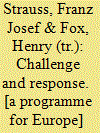

|
|
|
|
|
| Publication |
London, WeidenFeld and Nicolson, 1969.
|
| Description |
xiii, 176p.Hbk
|
| Standard Number |
297179500
|
|
|
|
|
|
|
|
|
|
|
|
Copies: C:1/I:0,R:0,Q:0
Circulation
| Accession# | Call# | Current Location | Status | Policy | Location |
| 003439 | 940/STR 003439 | Main | On Shelf | General | |
|
|
|
|
| 9 |
ID:
084628
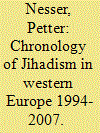

|
|
|
|
|
| Publication |
2008.
|
| Summary/Abstract |
Considering Europe's long history of terrorist violence by separatist, leftist and rightwing groups, terrorism by militant Sunni Islamists has until recently been a marginal phenomenon. However, empirical data presented in this chronology suggests it constitutes a growing and increasingly lethal threat, and a worrisome trend in the context of increased tensions between the Muslim world and the West in the wake of 9/11 and the U.S.-led invasions of Afghanistan and Iraq, which needs to be dealt with on many levels-socially, politically, and economically. The current chronology is meant to serve as a tool for conducting academic research on the scope of the threat, and for mapping incidents that might be surveyed in more depth to create a better understanding of its organizational, operational, and motivational patterns.
|
|
|
|
|
|
|
|
|
|
|
|
|
|
|
|
| 10 |
ID:
151626
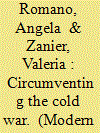

|
|
|
|
|
| Summary/Abstract |
This special issue brings together historians with expertise on China and Western Europe who have the explicit intent of bridging the existing gap between two parallel strands of scholarship, that is, Europe in the Cold War and the history of Socialist China, and combining the different perspectives and approaches of international, diplomatic, business, and cultural historiographies. The contributors’ lively interaction and close collaboration has been the key to the conceptual development of a broader view of the relations between West European countries and Socialist China in the early decades of the Cold War, as well as of China's policy towards the capitalist world before the Reform and Opening era.
|
|
|
|
|
|
|
|
|
|
|
|
|
|
|
|
| 11 |
ID:
191240
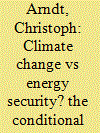

|
|
|
|
|
| Summary/Abstract |
The decarbonisation of Western societies requires a fundamental reorganisation of energy supply and fierce debates around the future energy mix have begun in many countries. However, we still know little about how concerns about energy security affect the public's energy preferences in view of the critique that renewable energies might compromise energy security. This paper argues that there is a perceived trade-off between energy security and climate protection that affects energy supply preferences in Western Europe. Using the European Social Survey's ‘Public Attitudes to Climate Change’ module, the findings from multilevel regressions demonstrate that there is indeed a perceived trade-off in energy preferences among Western Europeans. People concerned about energy security prefer coal, gas, and nuclear power over renewable energies. People worried about climate change prefer solar and wind energy over nuclear and fossil forms of energy. The analysis further identifies four different groups representing the trade-off between energy security and climate protection among Western Europeans. The paper thus identifies why energy preferences might collide and why some countries observe a polarisation of views around energy supply that policymakers need to address to realise a successful and publicly acceptable transformation of energy supply.
|
|
|
|
|
|
|
|
|
|
|
|
|
|
|
|
| 12 |
ID:
097024
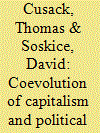

|
|
|
|
|
| Publication |
2010.
|
| Summary/Abstract |
Protocorporatist West European countries in which economic interests were collectively organized adopted PR in the first quarter of the twentieth century, whereas liberal countries in which economic interests were not collectively organized did not. Political parties, as Marcus Kreuzer points out, choose electoral systems. So how do economic interests translate into party political incentives to adopt electoral reform? We argue that parties in protocorporatist countries were "representative" of and closely linked to economic interests. As electoral competition in single member districts increased sharply up to World War I, great difficulties resulted for the representative parties whose leaders were seen as interest committed. They could not credibly compete for votes outside their interest without leadership changes or reductions in interest influence. Proportional representation offered an obvious solution, allowing parties to target their own voters and their organized interest to continue effective influence in the legislature. In each respect, the opposite was true of liberal countries. Data on party preferences strongly confirm this model. (Kreuzer's historical criticisms are largely incorrect, as shown in detail in the online supplementary Appendix.)
|
|
|
|
|
|
|
|
|
|
|
|
|
|
|
|
| 13 |
ID:
048360
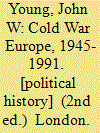

|
|
|
|
|
| Edition |
2nd ed.
|
| Publication |
London, Arnold, 1996.
|
| Description |
x, 292p.Pbk
|
| Standard Number |
0340625163
|
|
|
|
|
|
|
|
|
|
|
|
Copies: C:1/I:0,R:0,Q:0
Circulation
| Accession# | Call# | Current Location | Status | Policy | Location |
| 041479 | 940.55/YOU 041479 | Main | On Shelf | General | |
|
|
|
|
| 14 |
ID:
112496
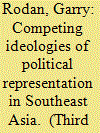

|
|
|
|
|
| Publication |
2012.
|
| Summary/Abstract |
In both post-authoritarian and authoritarian regimes in Southeast Asia there are continuing struggles over the forms and extent of political representation. Importantly, many of the same ideologies are present across these different categories of regime. Ideas of, and constituencies for, non-democratic representation exist in democratic societies and vice versa. Alongside democratic notions of representation, populist, localist and consensus rationales compete for support. However, in contests to shape political representation, historical factors, including legacies of the Cold War and structural impacts of global capitalist development, are not favourable to the pursuit of interests through the independent, collective action-especially cohesive social movements involving trade unions-that characterised the experiences of democratisation in Western Europe. This profoundly influences the complexion of and levels of support for different ideologies of representation in the region.
|
|
|
|
|
|
|
|
|
|
|
|
|
|
|
|
| 15 |
ID:
087046
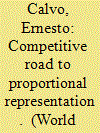

|
|
|
|
|
| Publication |
2009.
|
| Summary/Abstract |
One of the most noteworthy political regularities in the early twentieth century was the shift away from majoritarian electoral rules in Western Europe. The conventional wisdom suggests that proportional representation (pr) was introduced by elites who believed that under the existing majoritarian rules (simple plurality, block-vote, two-ballot rules) they would soon lose power to rapidly growing socialist parties. But this does not explain why many electoral reforms were carried out in countries with weak or nonexistent socialist parties. The author shows that increasing the number of parties distorts the seat-vote properties of electoral rules to a larger degree than previously anticipated. Under increasing party competition, electoral regimes display larger partisan biases than those observed in two-party races and crowd out minority parties that have territorially dispersed constituencies in favor of minority parties that have territorially concentrated constituencies. Using a dynamic Bayesian model for seats and votes, the author measures the partisan biases brought about by the expansion of voting rights in the late nineteenth century to explain the drive to reform majoritarian electoral systems.
|
|
|
|
|
|
|
|
|
|
|
|
|
|
|
|
| 16 |
ID:
160127


|
|
|
|
|
| Summary/Abstract |
A comparative analysis of Islamic extremism post-9/11 to 2015 and the effectiveness of the counterterrorism (CT) authorities to counter it in both Western Europe and the United States was conducted. Four measures of effectiveness revealed that 2010–2015 saw a gradual increase in jihadi attacks and in casualties emanating from these attacks, and more jihadists, foreign fighters, and material supporters. Additionally, 2013–2015 saw a 22 percent reduction both in Western Europe and the U.S. CT agencies' ability to counter Islamic extremism. We are losing the War on Terror and our citizens are less safe than they were six years ago. Further analysis revealed that singleton jihadists: (1) were much harder than group-based jihadists to uncover, (2) have been increasing since 2009, and (3) have generated over 70 percent of all jihadi violence. Finally, numerous similarities exist between Western Europe and the United States with respect to jihadism in their homelands and their respective CT effectiveness, indicating close cross-Atlantic CT collaboration since 9/11. This in-depth analysis provides essential threat/hazard information to security, law enforcement, intelligence, and policymaking personnel and the greater homeland security communities.
|
|
|
|
|
|
|
|
|
|
|
|
|
|
|
|
| 17 |
ID:
132630
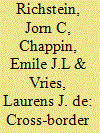

|
|
|
|
|
| Publication |
2014.
|
| Summary/Abstract |
The recent low CO2 prices in the European Union Emission Trading Scheme (EU ETS) have triggered a discussion whether the EU ETS needs to be adjusted. We study the effects of CO2 price floors and a price ceiling on the dynamic investment pathway of two interlinked electricity markets (loosely based on Great Britain, which already has introduced a price floor, and on Central Western Europe). Using an agent-based electricity market simulation with endogenous investment and a CO2 market (including banking), we analyse the cross-border effects of national policies as well as system-wide policy options.
A common, moderate CO2 auction reserve price results in a more continuous decarbonisation pathway. This reduces CO2 price volatility and the occurrence of carbon shortage price periods, as well as the average cost to consumers. A price ceiling can shield consumers from extreme price shocks. These price restrictions do not cause a large risk of an overall emissions overshoot in the long run. A national price floor lowers the cost to consumers in the other zone; the larger the zone with the price floor, the stronger the effect. Price floors that are too high lead to inefficiencies in investment choices and to higher consumer costs.
|
|
|
|
|
|
|
|
|
|
|
|
|
|
|
|
| 18 |
ID:
056217
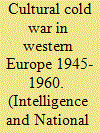

|
|
|
| 19 |
ID:
143228
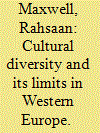

|
|
|
|
|
| Summary/Abstract |
The next generation of diverse Europeans will inhabit a world in which cultural mixtures are standard and historical nation-states are the starting points rather than the final definition of culture.”
|
|
|
|
|
|
|
|
|
|
|
|
|
|
|
|
| 20 |
ID:
148765
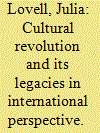

|
|
|
|
|
| Summary/Abstract |
This article explores the rhetoric and reality of the Cultural Revolution as an international phenomenon, examining (through published and oral histories) the ways in which it was perceived and interpreted beyond China. It focuses in particular on the diverse impact of Maoist ideas and practice on the counterculture movement of Western Europe and North America during the late 1960s and 1970s. Within Europe, Cultural Revolution Maoism galvanized Dadaist student protest, nurtured feminist and gay rights activism, and legitimized urban guerrilla terrorism. In the United States, meanwhile, it bolstered a broad programme of anti-racist civil rights campaigns and narrow Marxist-Leninist party-building. Despite Mao's hopes to launch a global permanent revolution, it appears that, over the long term, enthusiasm for the Cultural Revolution in Western Europe, the United States and parts of South-East Asia helped to splinter the radical left and assisted the right in consolidating its power throughout the 1980s and beyond.
|
|
|
|
|
|
|
|
|
|
|
|
|
|
|
|
|
|
|
|
|